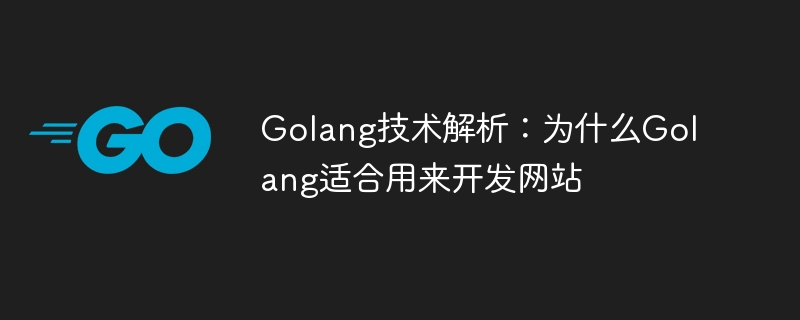

In today's era of rapid development of the Internet, websites have become an indispensable part of people's lives. Website development technology is also constantly updated and evolving, among which Golang has attracted much attention as a development language. This article will explore why Golang is suitable for website development and combine it with specific code examples to demonstrate its advantages.
First of all, Golang is a compiled, statically typed language with concurrent programming capabilities, which gives it unique advantages in developing high-performance, high-concurrency websites. In traditional website development, an important challenge is the problem of high concurrency, especially when the number of users is huge. Golang inherently supports concurrent programming, and implements lightweight thread management through goroutine, which can easily cope with high concurrency requirements. The following is a simple example code to implement concurrent processing of requests through goroutine:
package main
import (
"fmt"
"net/http"
)
func handler(w http.ResponseWriter, r *http.Request) {
fmt.Fprintf(w, "Hello, Golang!")
}
func main() {
http.HandleFunc("/", handler)
http.ListenAndServe(":8080", nil)
}In the above code, we use the http package to create a simple HTTP server. When a request is received, the handler function will be called to process the request. Start the server through http.ListenAndServe. The service will listen and process requests on port 8080. This simple and efficient concurrency processing method provides strong support for Golang's application in website development.
Secondly, Golang has good performance. The compiled executable file is small in size and fast in startup speed, which gives it obvious advantages in network development. The access speed of the website directly determines the user experience, and programs written in Golang perform excellently in terms of speed. Here is an example of creating a simple HTTP server using the Golang standard library:
package main
import (
"fmt"
"net/http"
)
func handler(w http.ResponseWriter, r *http.Request) {
fmt.Fprintf(w, "Hello, Golang!")
}
func main() {
http.HandleFunc("/", handler)
http.ListenAndServe(":8080", nil)
}Through the above sample code, we can see that using Golang to write a simple HTTP server is very simple and efficient. The Golang standard library provides a wealth of network processing tools, allowing developers to quickly build a high-performance website service.
In addition, Golang has rich third-party library and framework support, making website development more convenient and efficient. For example, frameworks such as Gin and Beego provide a wealth of functions and components to help developers quickly build complex website systems. Here is an example of using the Gin framework to create a simple API service:
package main
import "github.com/gin-gonic/gin"
func main() {
r := gin.Default()
r.GET("/hello", func(c *gin.Context) {
c.JSON(200, gin.H{
"message": "Hello, Golang!",
})
})
r.Run(":8080")
}Through the above sample code, we can see that it is very simple to create an API service using the Gin framework. The framework provides routing, middleware and other functions, so developers can easily implement various functional requirements while maintaining code clarity and maintainability.
In general, Golang, as an excellent programming language, has many advantages in website development, including concurrent processing capabilities, good performance, rich third-party libraries and framework support, etc. Through specific code examples, we can more intuitively feel the powerful potential of Golang in website development and show its broader prospects in future development.
The above is the detailed content of Golang technical analysis: Why Golang is suitable for website development. For more information, please follow other related articles on the PHP Chinese website!




